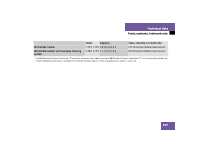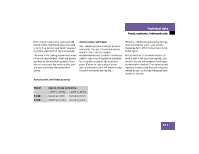2003 Mercedes E-Class Owner's Manual - Page 369
2003 Mercedes E-Class Manual
Page 369 highlights
Technical data Fuels, coolants, lubricants etc. Premium unleaded gasoline Fuel requirements Use only premium unleaded gasoline meeting ASTM standard D 439: The octane number (posted at the pump) must be 91 min. It is an average of both the Research (R) Octane Number and the Motor (M) Octane Number: (R+M)/2). This is also known as the ANTI-KNOCK INDEX. Unleaded gasoline containing oxygenates such as ethanol, IPA, IBA and TBA can be used provided the ratio of any one of these oxygenates to gasoline does not exceed 10%; MTBE is not to exceed 15%. The ratio of methanol to gasoline must not exceed 3% plus additional cosolvents. Using mixtures of ethanol and methanol is not allowed. Gasohol, which contains 10% ethanol and 90% unleaded gasoline, can be used. These blends must also meet all other fuel requirements, such as resistance to spark knock, boiling range, vapor pressure, etc. Gasoline additives A major concern among engine manufacturers is carbon build-up caused by gasoline. Mercedes-Benz recommends only the use of quality gasoline containing additives that prevent the build-up of carbon deposits. After an extended period of using fuels without such additives, carbon deposits can build up especially on the intake valves and in the combustion area, leading to engine performance problems such as: Warm-up hesitation Unstable idle Knocking/pinging Misfire Power loss Do not blend any specific fuel additives with fuel. This only results in unnecessary costs and may be harmful to the engine operation. ! To maintain the engine's durability and performance, premium unleaded gasoline must be used. If premium unleaded gasoline is not available and low octane fuel is used, follow these precautions: Have the fuel tank only partially filled with unleaded regular and fill up with premium unleaded as soon as possible Avoid full throttle driving and abrupt acceleration Do not exceed an engine speed of 3000 rpm if the vehicle is loaded with a light load such as two persons and no luggage Do not exceed 2/3 of maximum accelerator pedal position if the vehicle is fully loaded or operating in mountainous terrain 369
















